Guide to Buying a Campervan in New Zealand
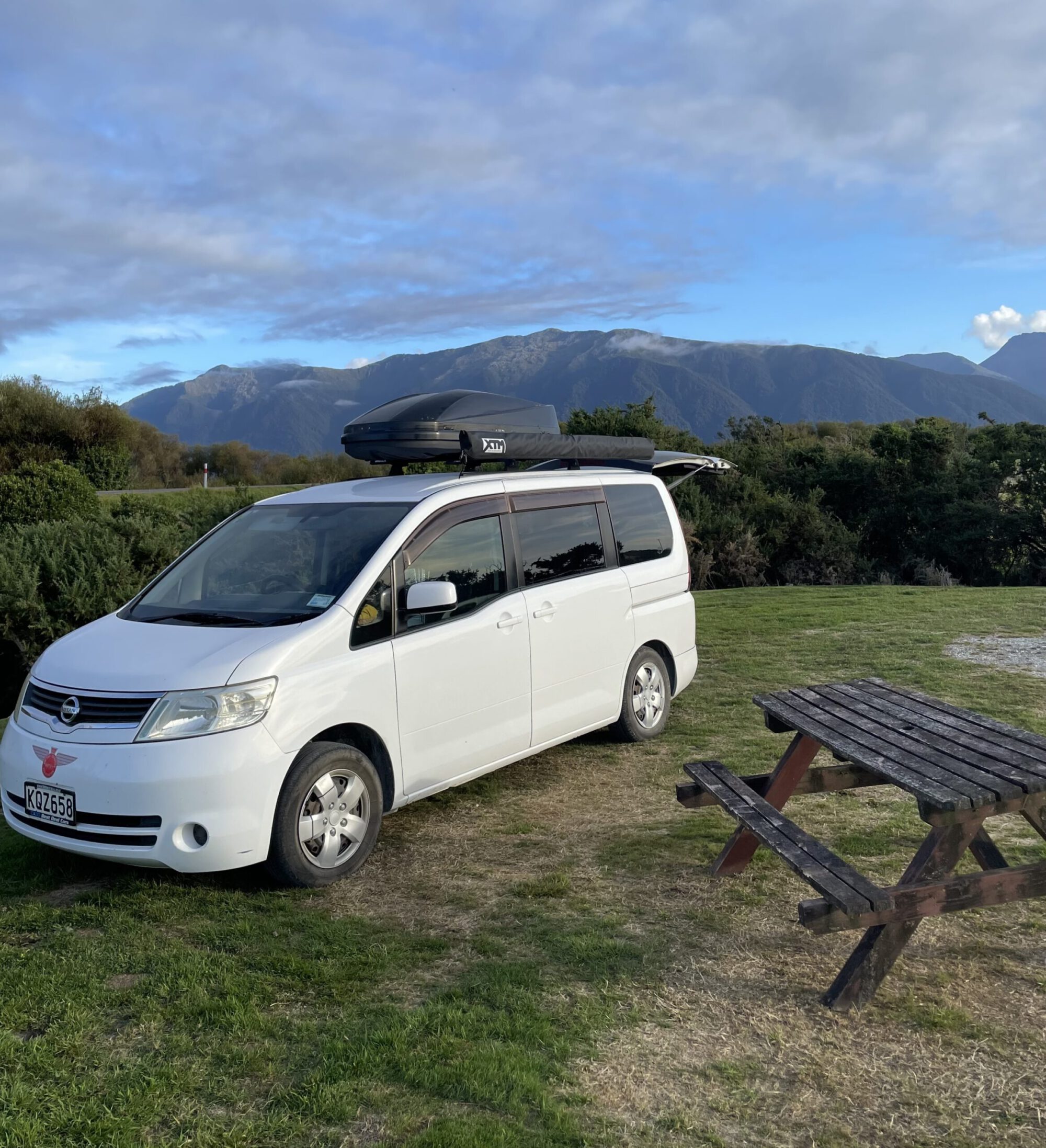
Are you planning on buying a campervan in New Zealand? The idea of purchasing a vehicle in a foreign country can be intimidating, but fear not! I’m here to provide you the ultimate guide to buying a campervan in New Zealand. The process is surprisingly straightforward once you have the necessary information to make your purchase.
As someone who embarked on a working holiday visa in this beautiful country, I quickly realized that buying a van was the ideal way to explore its breathtaking landscapes. However, before making any decisions, there are crucial aspects you should be aware of. I’m going to answer all your questions that have to do with buying a campervan in New Zealand including how to pay for it, best insurance policies, licenses, and more so you’ll have all your bases covered. I spent countless hours scouring the internet for answers. Ultimately, I had to learn many lessons the hard way but I’m here to share those lessons so you can seamlessly purchase and enjoy your future campervan.
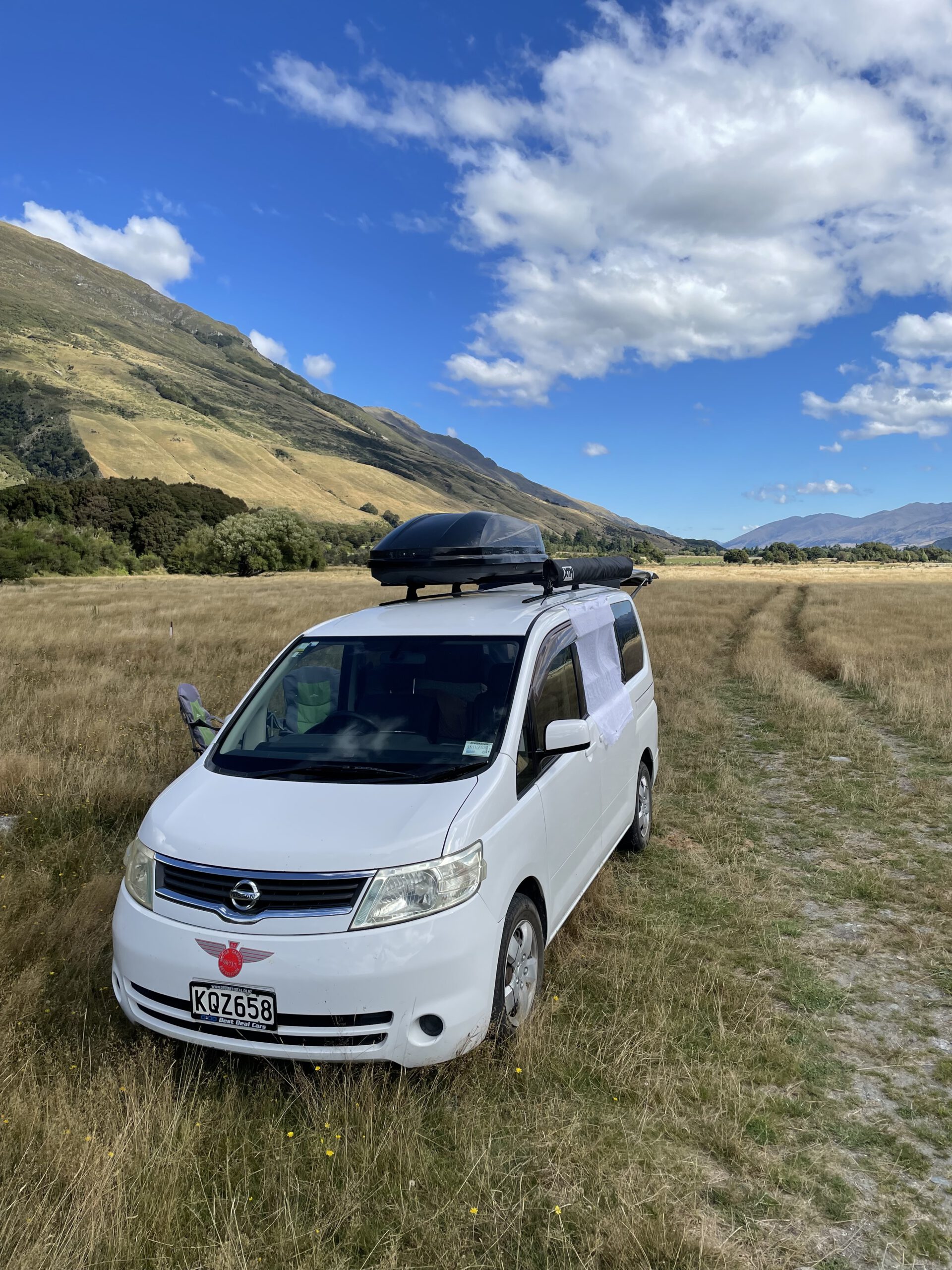

Renting vs Buying
Buying and selling a vehicle takes time and effort. It can take anywhere from a few days to a few weeks to sell a campervan. For that reason, if you plan on spending more than two months traveling New Zealand, I recommend buying a campervan. Renting can get expensive and you will most likely lose more money renting than buying if you will be in New Zealand for an extended amount of time.
Buying a Campervan In New Zealand
Where To Buy a Campervan
There are a lot of places you can look to find a van. However, I found that the best place to purchase a van was by scanning Facebook Marketplace and joining backpacker/van Facebook groups. These vans were the most affordable and there is a high turnover rate on Facebook so you can find exactly what you are looking for. I joined Facebook groups before I even got to New Zealand to get an idea of what was on the market and the average cost. Our first van was purchased on a backpacker Facebook page and our second van, we bought off of Facebook Marketplace.
How Much to Spend on a Campervan
It’s really important to gauge the van market. If you head to New Zealand during summer expect to pay more. If you head to New Zealand in the winter, expect to find a great deal. How much you choose to spend on a van or a car is going to come down to what type of van you want and its features. Self contained, lower mileage, caravans are going to be costlier. Minivans that have high mileage and are not self contained are going to be cheaper. You can expect to spend anywhere from 2,000 NZD to 12,000 NZD on a campervan.
Don’t let people rip you off. It’s common to find old vans priced really high in some of the Facebook groups, especially during the summer months when the market is hot. Make sure that you are making an educated decision when buying a campervan in New Zealand.
How to Pay for Your Campervan
Paying for a van or a car in a foreign country is where I thought it would get tricky. If you just arrived in New Zealand you probably don’t have a bank account yet and you definitely don’t want to carry a wad of cash around a city. The easiest and most efficient way to pay for a van is with Wise. I hadn’t heard of Wise before getting to New Zealand. It’s a money transfer app that works with all types of foreign currencies and bank accounts. When we bought our first van the money transfer took less than a day! When we paid a local Kiwi through Wise, we transferred the money to him over the weekend and it arrived that next Monday. I highly recommend Wise for fast and secure money transfers.
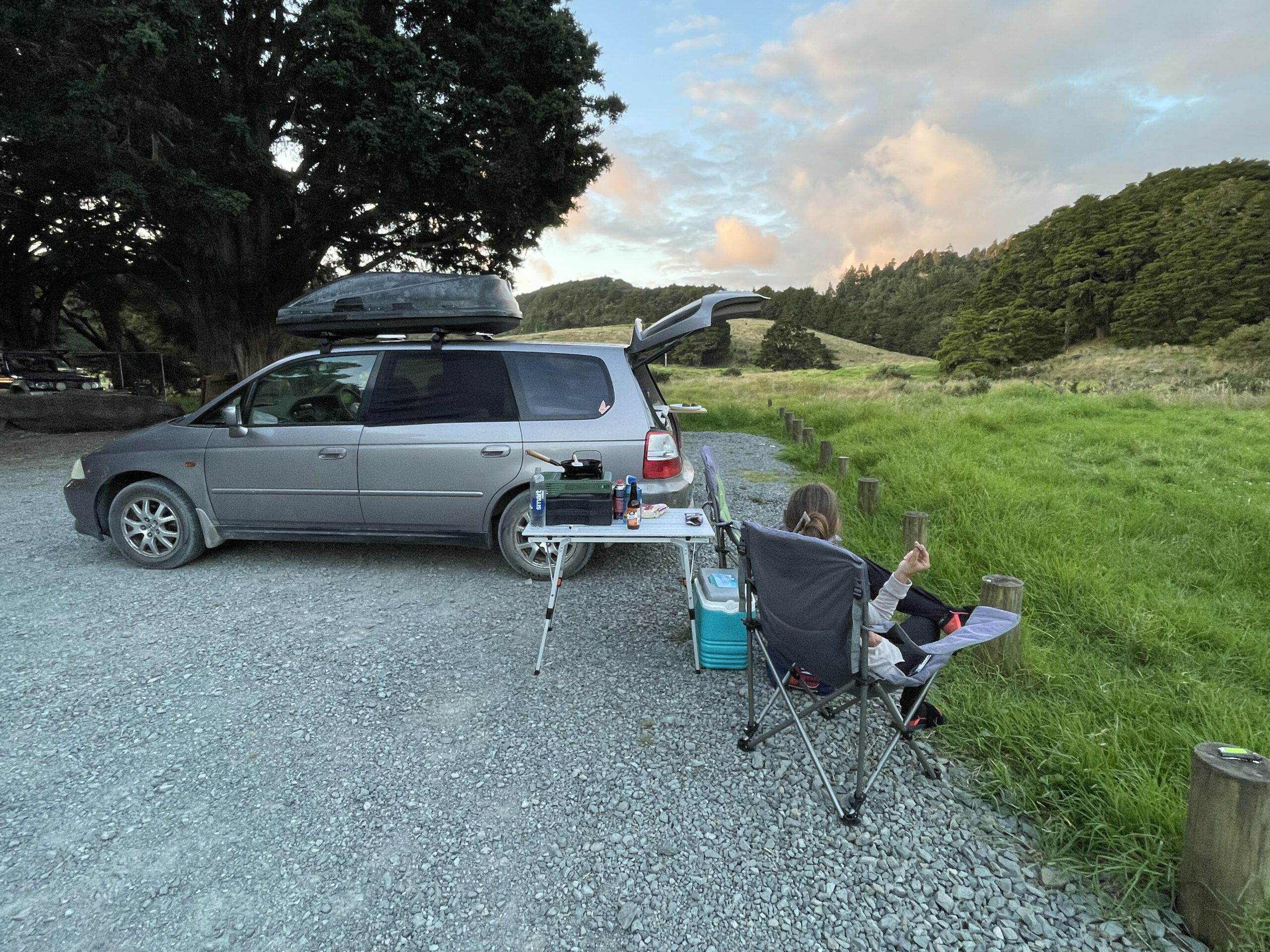
Things to Consider Before Buying a Campervan
Type of Campervan
Choosing which type of car or van you want to travel in is important. There are cars that fit a bed in the back to sleep in. There are minivans that will give you more space and may be self contained. You might also consider a caravan if you plan on staying in New Zealand for a full year or longer. The type of vehicle you choose will be based on your needs while you travel New Zealand and the amount of money you are willing to invest.
Self Contained vs Non-Self Contained
A self contained vehicle gives you more camping options when in New Zealand. A self contained vehicle will likely cost more too. This certification means that your van is equipped to provide running water and a toilet for up to three days for each person in the van. Basically what this means, is having access to a pump sink and a portable toilet that can hold a certain amount of water and a certain amount of waste per person.
Four Wheel Drive
New Zealand is full of unpaved, bumpy roads. If you enjoy your solitude and being away from the crowds, consider a 4 wheel drive vehicle.
The Year
2000 vehicles and newer only need a WoF (warrant of fitness) once a year. Anything older than a 2000 make will need a WoF every 6 months. This causes more maintenance for you and overall, it’s costlier. A newer vehicle will likely give you less issues than an older vehicle as well.
Diesel vs Petrol
There’s a Road User Charge (RUC) for diesel vehicles. Petrol tends to cost more at the pump than diesel because tax is already incorporated for petrol. Tax is not already incorporated for diesel at the pump therefore you will pay tax on it for every 1,000km that you drive. This tax is based on how many kilometers you travel, the vehicle’s weight, and its type.
Campervan Interior
Take into consideration the interior of the van such as how comfortable the bed is, the privacy of the blinds, and the space in the van. Our second van had an 8 inch memory foam mattress. It was far more comfortable than our first van and made it easy to sleep at night. Keep in mind many backpacker vans come outfitted with thin, cheap foam on top of plywood. This is not ideal if you plan on spending every night in your vehicle. Taking into consideration how often you’ll be sleeping in your van is really important. It’ll be your safe space when traveling and you’ll want it to suit all of your needs on the road.
Ventilation
It is difficult sleeping with your van windows up because of how stuffy it gets. If it’s raining or the bugs are relentless you won’t be able to have your windows down. Rain guards allowed us to have our windows cracked when it was raining. These were a lifesaver and I would never recommend buying a van without them. Bug netting is also going to allow you to have great ventilation while keeping the pesky mosquitoes and sand flies out.
Extra Seating
Many vans that are built out for sleeping don’t seat more than two people. If you’re traveling with more than two people, be aware of seating causing a potential issue.
Extra Equipment
Our first van came with pots, pan, cooking utensils, a roof box, spare tire, and a bunch of other very useful things. We didn’t know how useful having a roof box would be. We wouldn’t have had enough space if it weren’t for our roof box. It’s important to consider additional items such as a storage box.
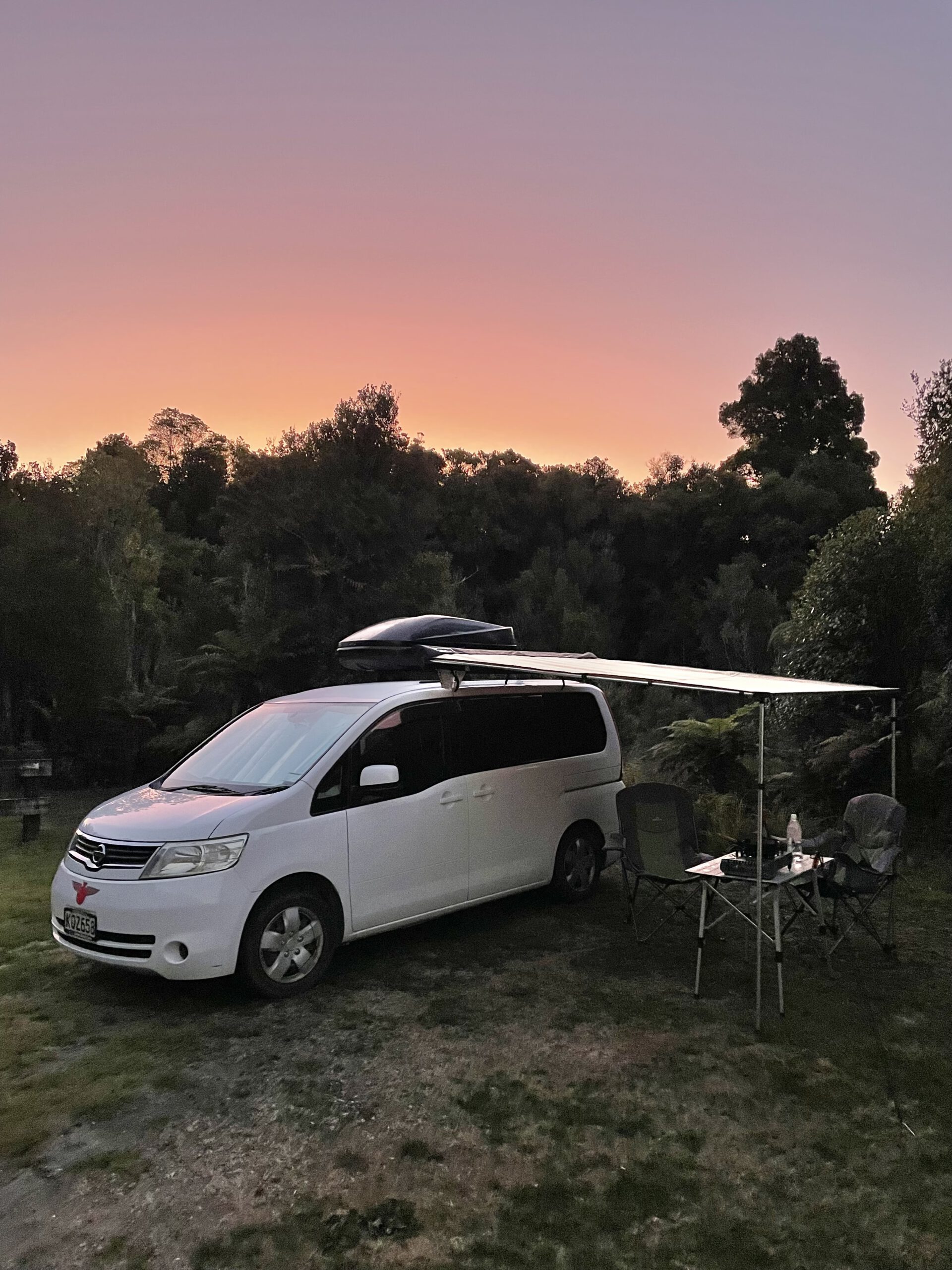
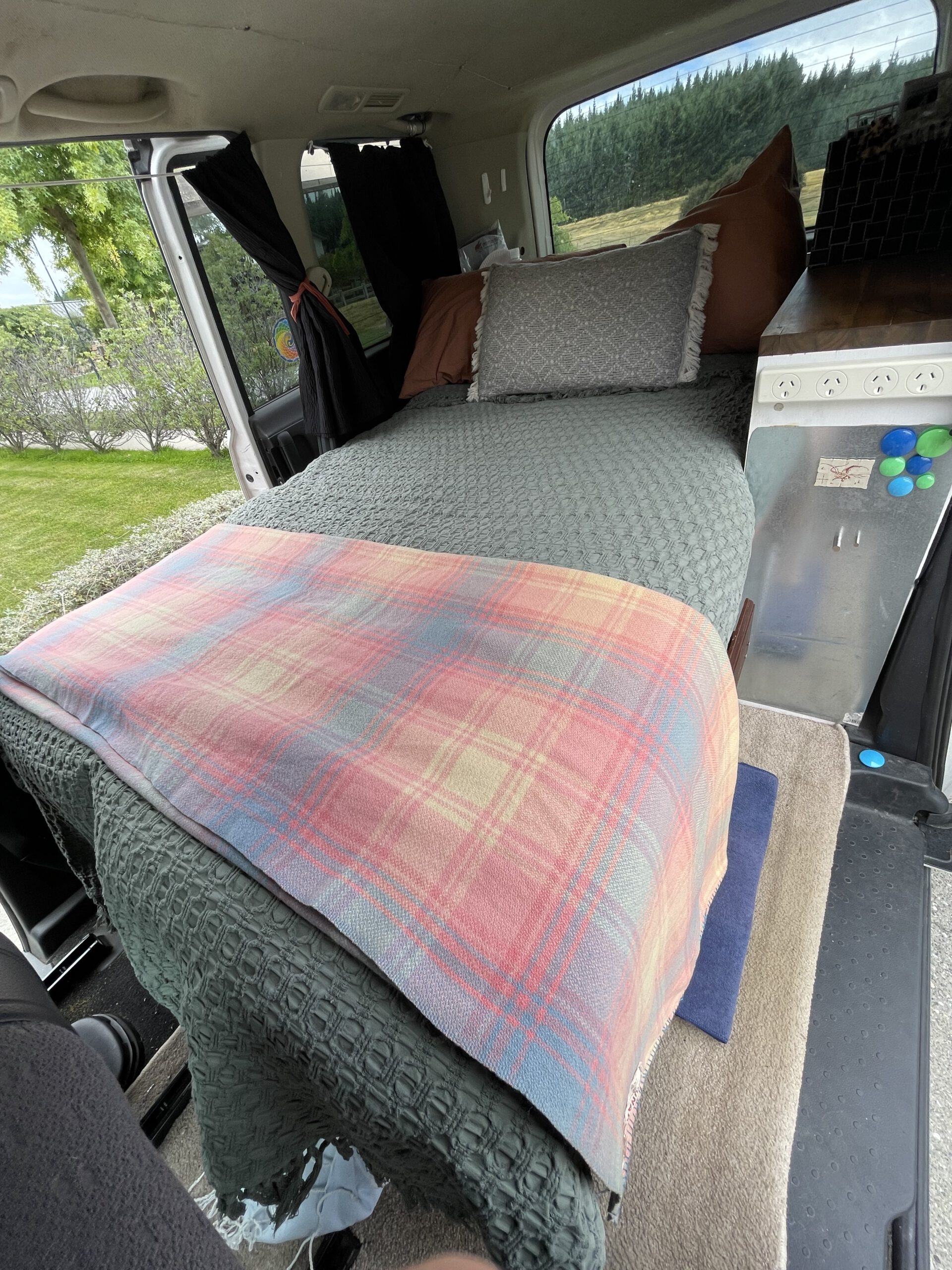
Things to Look For Before Buying a Campervan…
Self Contained Documentation
Always ask to see the documentation associated with the self containment status of the vehicle. There should be a SC sticker on the back and front of the vehicle as well as paper documentation noting where the inspection was done and when the SC stickers expire.
Pre-Purchase Inspection
ALWAYS get a pre-purchase inspection before buying a campervan. A pre-purchase inspection is when you take the vehicle to a mechanic and get it checked out. Some mechanics are more thorough than others but if there is something seriously wrong, it will show itself when a mechanic takes a look at it. If the owner of the vehicle doesn’t want you getting a pre-purchase inspection…run. This is not a good sign and that vehicle most likely has a significant issue.
If you don’t get a pre-purchase inspection and something goes seriously wrong with the vehicle after purchase, it will be entirely on you to incur the costs. If there is anything wrong with the vehicle or something needs replacing, this gives you negotiating power with the seller. We came across far too many horror stories with vans breaking down soon after purchase, that we chose to always opt for the pre-purchase inspection.
Service History
Service history will let you know that the van has been well maintained and looked after. It should give you the most recent history as well so you know when the vehicle is due for its next service.
Tire Condition
Tires can be costly and that may not be a cost you will want to incur if they are worn down at the time of purchase. If you’re choosing to drive the entire country of New Zealand, you will want your tires in good condition. If they aren’t, the vehicle will not pass it’s next WoF and you will have to pay for new tires.
Test Drive
Always take the vehicle for a test drive and try to get it up to highway speed. Both of the vans we bought received a pre-purchase inspection. We drove each van to the mechanic for the inspection and this allowed us to take the van for a test drive and also check out the interior without the owner hovering. This is a great time to test the pump sink, check out the bed, and get an overall feel of the van.
Mold
Look for signs of mold when you take a look at the vehicle you plan to purchase. This could be a sign of an unhealthy living situation since mold can be very dangerous for your health.
Rust
Rust is an automatic fail on a WoF. If your van has rust in the wrong places it may as well be worth nothing. Pre-purchase inspection mechanics make sure no rust is present on the vehicle.
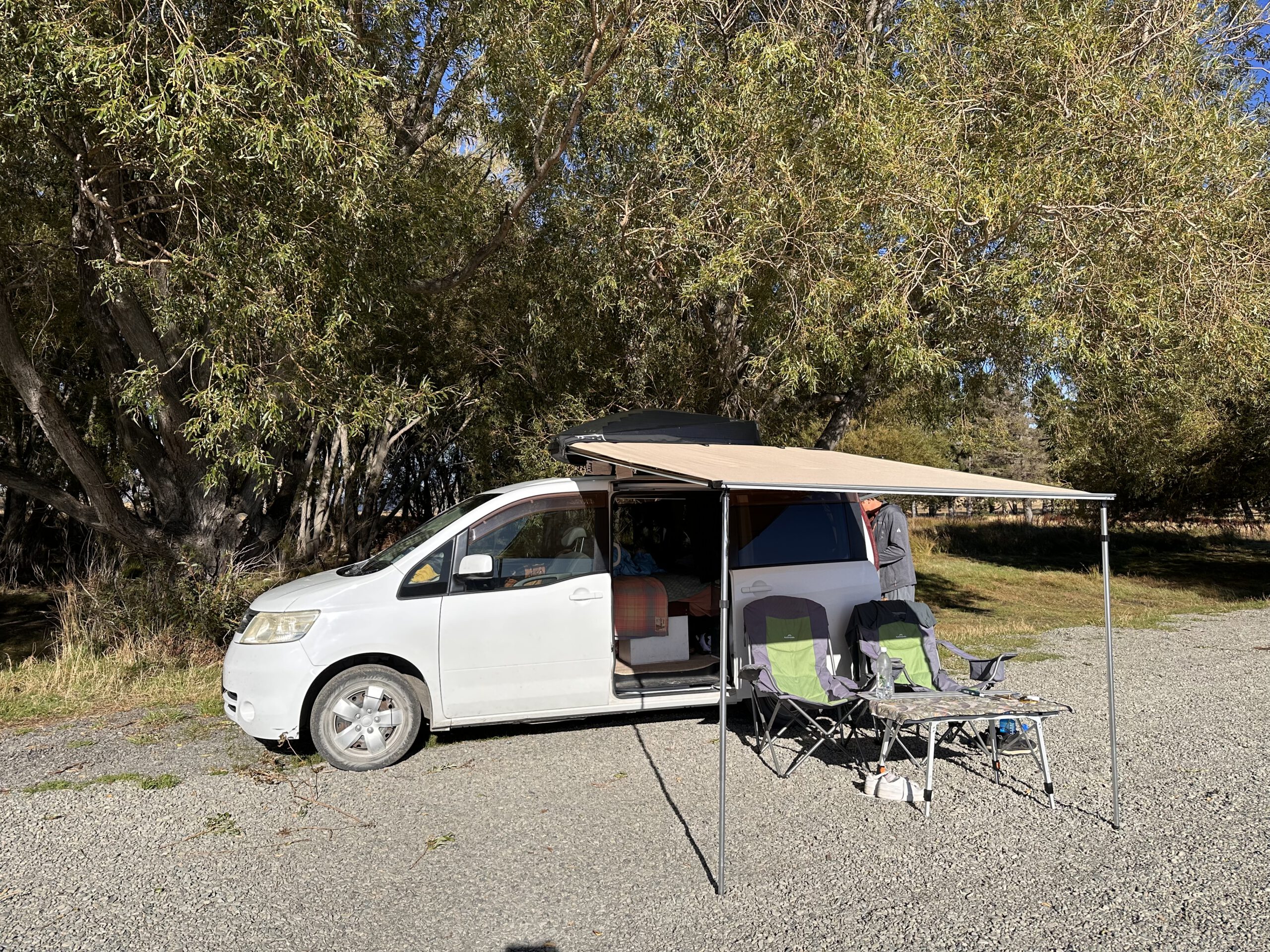
Paperwork for Campervan
New Zealand License
You can legally drive in New Zealand if you have a current driver’s license from your home country or an International Driving Permit. However, after 12 months you are legally required to apply for a New Zealand license.
Warrant of Fitness (WoF)
The Warrant of Fitness is a requirement for all vehicles. It is a regular check done by an authorized WoF agent to make sure your vehicle adheres to required safety standards. If your van was registered anywhere after January 1, 2000 you only need to get a warrant of fitness once a year. If your vehicle was registered anywhere before January 1, 2000 you will need a WoF every 6 months.
REGO
Your REGO or vehicle licensing is what allows you to operate your vehicle or campervan on public roads in New Zealand. You pay a fee online to maintain your REGO and in return you get a sticker to display on the vehicle. This sticker will display the month and year that your REGO expires. To renew it, you can do so online. Keep in mind, your vehicle needs to be both registered and licensed in your name.
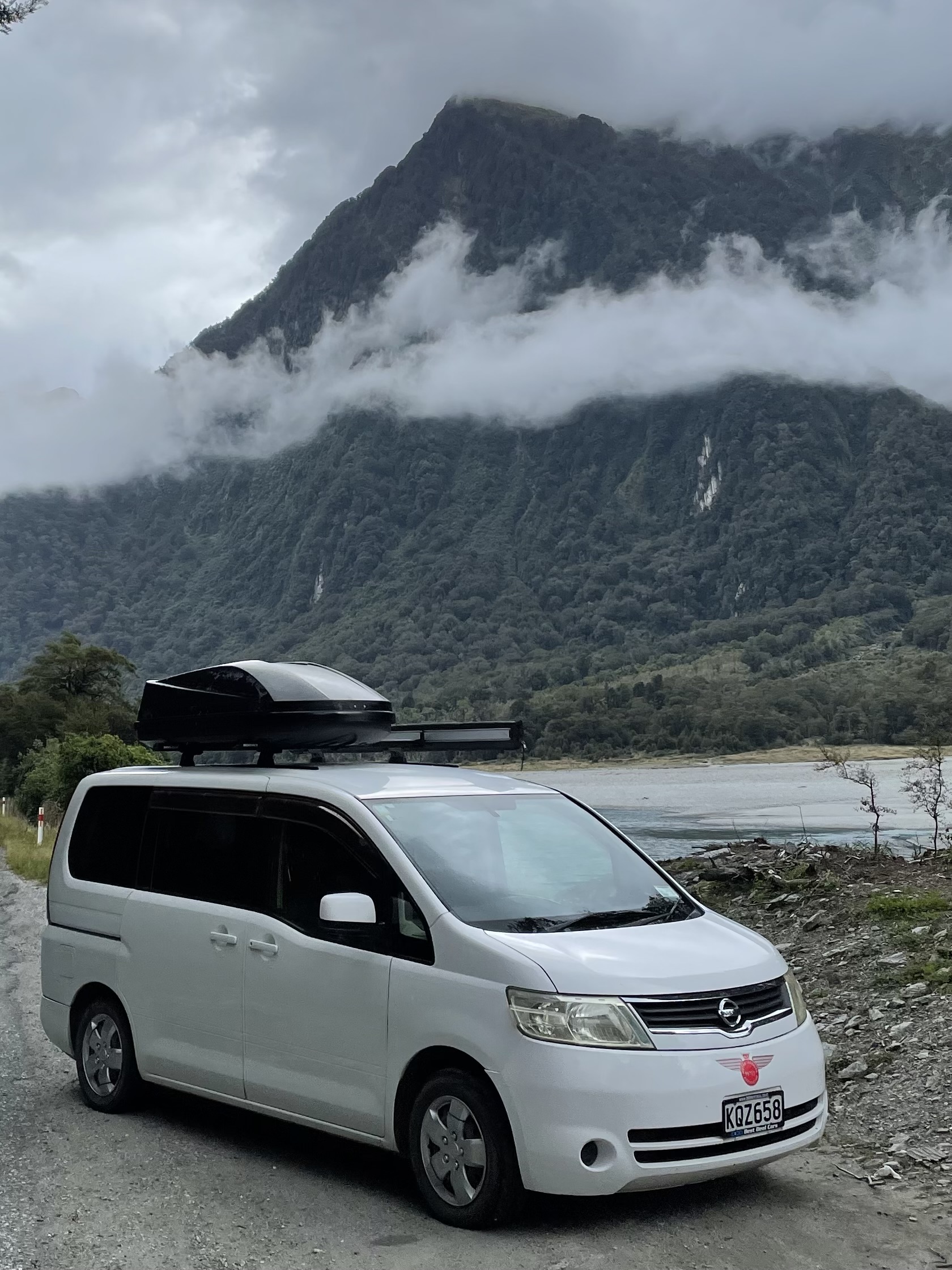
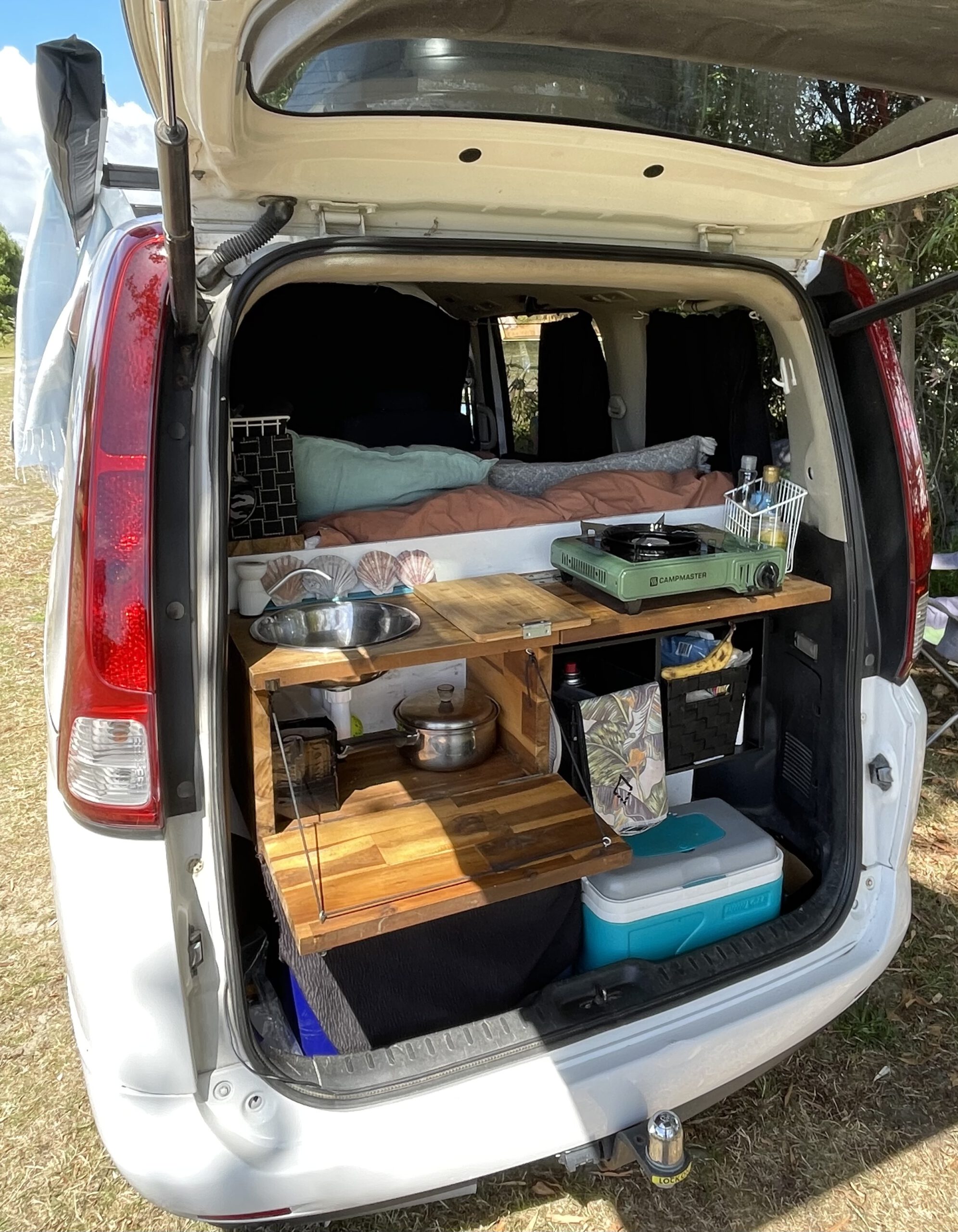
After Buying a Van
Change of Ownership
After buying a campervan, the first thing you need to do is switch the van’s ownership. You can do so in person for a small fee, at any AA office near you. If you are a New Zealand citizen you can change the ownership online.
Campervan Insurance
There are a couple different types of car insurance. Technically, you do not need car insurance in New Zealand. However, I highly recommend you get some sort of car insurance.
Full Coverage
This insurance is truly the way to go. It protects you if you injure someone or damage someone else’s property. It also protects your vehicle if someone hits you. With AA full coverage insurance, they include excess free glass repairs. This is absolutely necessary to have in New Zealand. There is construction everywhere and that creates loose gravel on the roads. We had our windshield get hit twice when on the south island. We paid $0 to have our windshield replaced. If we did not have full insurance we would have paid hundreds of dollars.
Third Party
This type of insurance will only protect you if you are to damage somebody else’s property or injure someone else. This type of insurance will not protect you if you damage your vehicle in any way. Third party insurance is what we had on our first van. We only paid 2250 NZD for it which is why we decided on the cheaper insurance. We learned our lesson when our van was totalled after an undiagnosable electrical issue. We had to scrap it for parts and purchase a new van. If we had full coverage, we wouldn’t have had such a significant financial loss.
AA Road Service Membership
AA also offers an annual membership for roadside assistance. You can pay a flat fee for the year and if you need a tow, get locked out, or need a jump start they are there to help you. We got the basic membership and ended up using it for a tow when our first van broke down.
Cost of Campervan Insurance and How to Pay
Since both of our vans were self contained they were technically considered motorhomes. If you choose to purchase your insurance with AA you can pay fortnightly or monthly. Since we knew we would only be in New Zealand for a few months we chose to pay fortnightly. You must have a New Zealand form of payment. I used my ANZ bank debit card and AA withdrew insurance every two weeks.
For our second van that we insured at 8,000 NZD, we paid 35 NZD every two weeks. Keep in mind this insurance covered excess free glass repairs so it was definitely worth it. Campervan insurance in New Zealand is far cheaper than vehicle insurance in the United States.
We recommend AA Insurance because we never had an issue with them. AA is also a one stop shop. You can change the ownership of your van when you buy it at an AA office and then one of their insurance agents can get you set up with vehicle insurance and a roadside membership if you choose to do so.
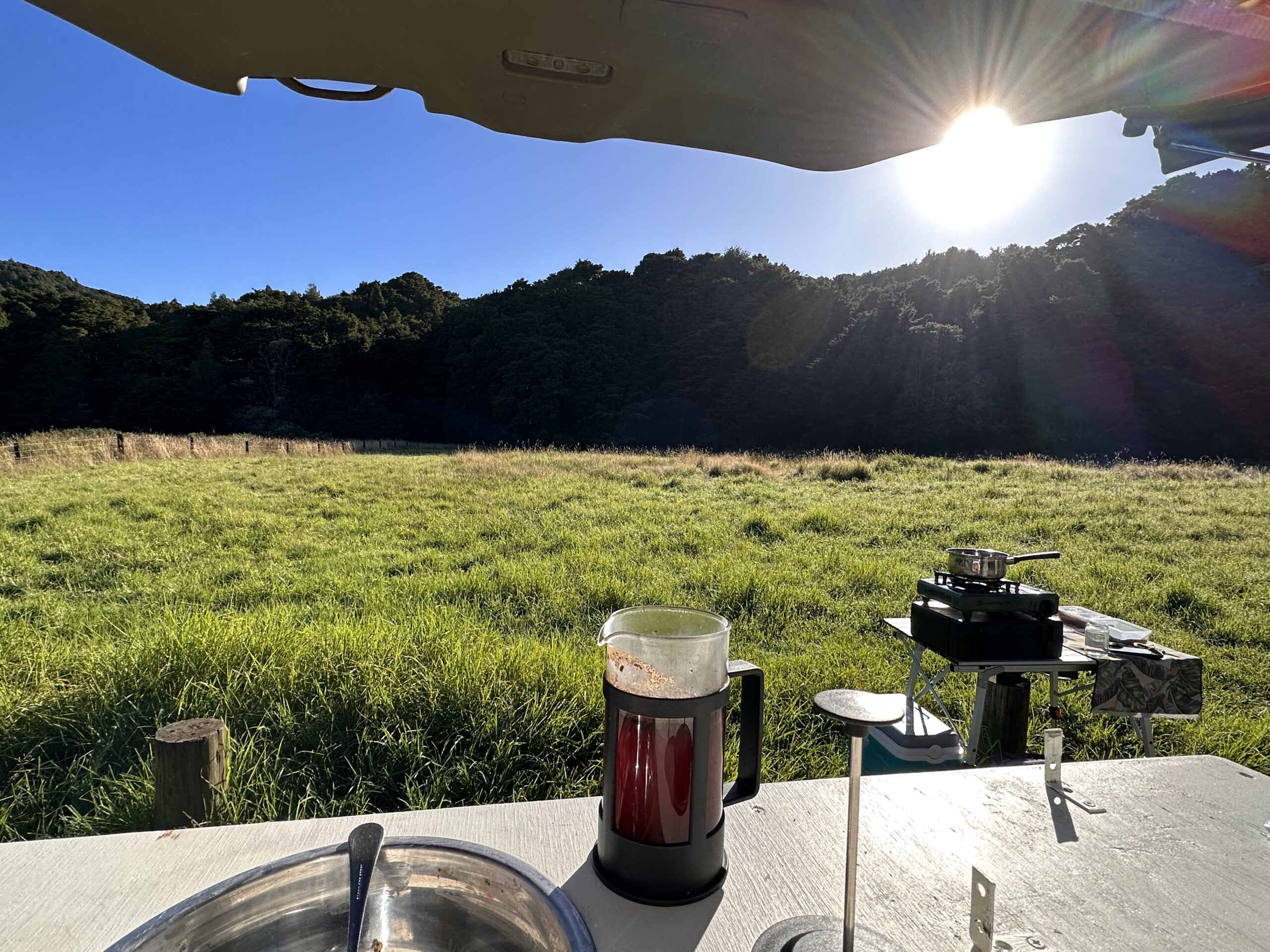
Buying a campervan van in a foreign country can seem like an overwhelming process. However, it’s one of the best choices I ever made. New Zealand is a country geared towards people who want to adventure and enjoy the outdoors and there’s no better way to do that than traveling in a campervan.
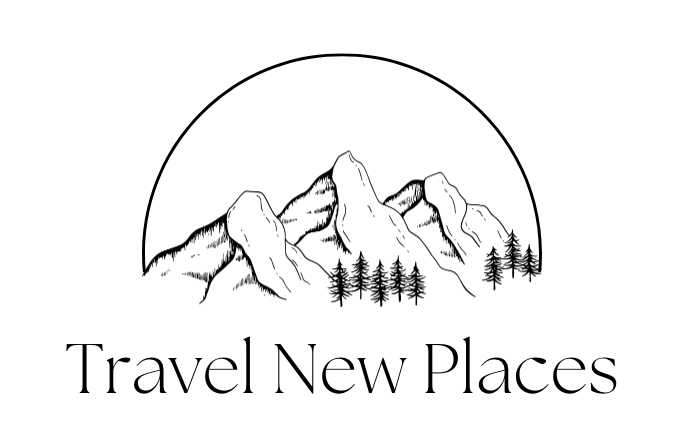
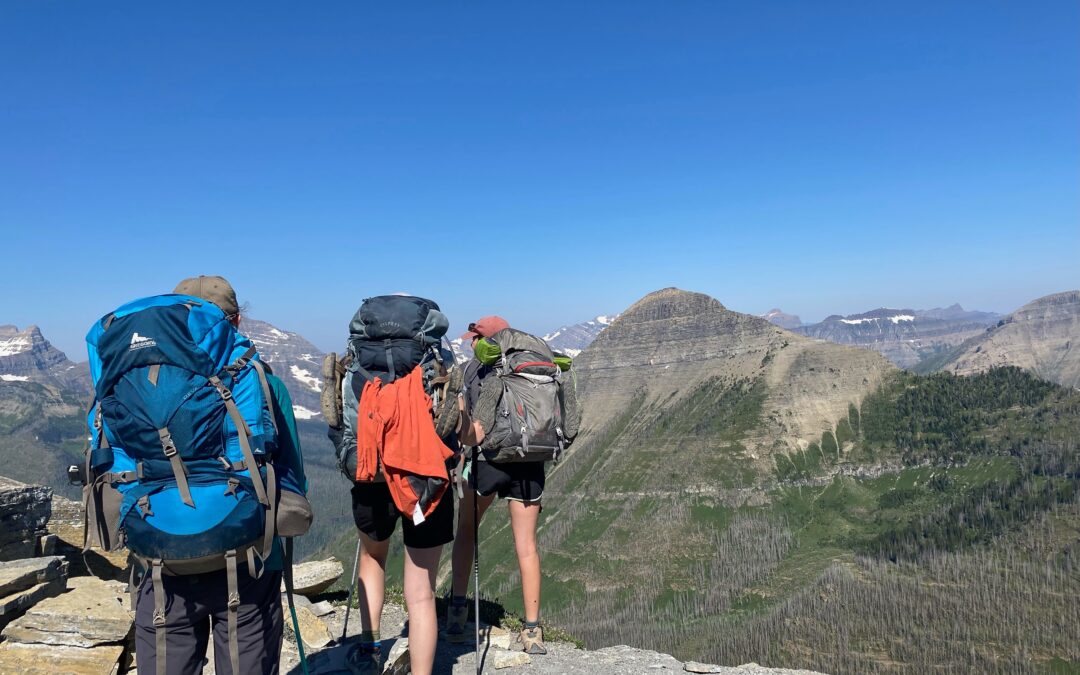
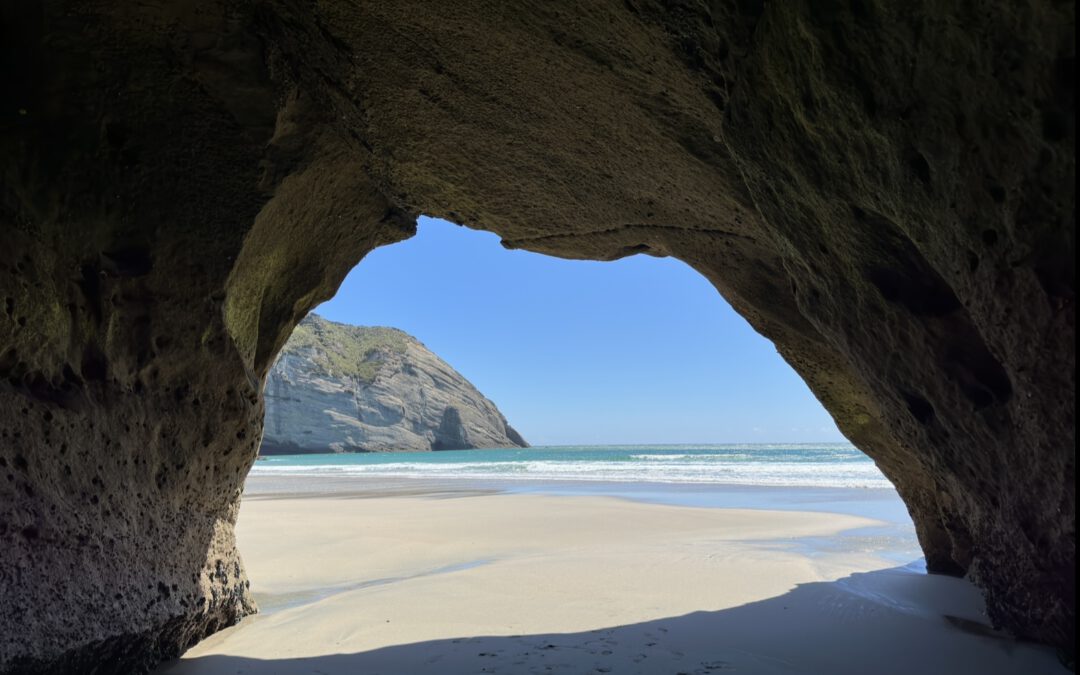
0 Comments